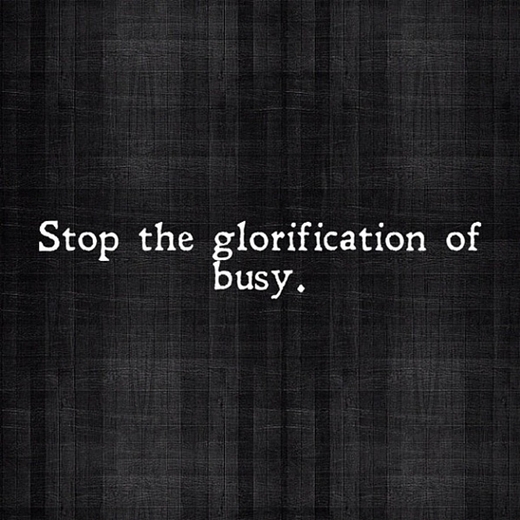I read this in Slate before I went to bed last night and it resonated with me. Essentially, if we view the idea of being busy as so awful, why do we constantly tell others about it in a way that’s akin to bragging?
Being Busy Is The Currency of the Modern Age
The real answer, of course, is that we don’t think of being busy as awful — we think of it as currency for the modern age. It’s almost like the whole “Get busy living … or get busy dying” idea, although simply remove the word “living” and you have the attitude of most Americans (I can’t speak for the rest of the world, as I have no real knowledge of that). As noted in the Slate article, being told you’re not busy is akin to being told you’re redundant or obsolete.
Written about this a little bit before: here, here, here, here, and here. (Clearly this is something I think about a lot.)
Here’s a quick example: in summer 2013, I worked for a Fortune 15 company for about 12 weeks (it was an assignment between my two years of graduate school, often called “an internship,” which always feels weird to say when you’re north of 30). Anyway, at this job I had a primary function, and I’d say said function took me about 22 hours a week, but I was supposed to be working about 40-55 (the north end being to impress people by burning the midnight oil). Seeing that it was fairly ludicrous to sit around 33 extra hours and not really do anything, I went around to different managers and essentially asked if there was anything on their plate that I could offload.
It should be noted that I wasn’t asking to do complex financial work or legal work — things where I wouldn’t have training. In some cases, I was literally asking to write memos or help with Excel documents just to feel like I was doing more. The oddest thing would happen in these meetings; people would typically tell me that it was such a nice gesture, but they were so busy that they didn’t have the time to off-load anything. Hmmm. Doesn’t that seem paradoxical? I understand the lens they were probably viewing it through: I was just there for the summer, so they didn’t really know me. They probably assumed I wasn’t 100 percent bright and that off-loading work would require training me on something, and their calendar was already color-chocked with meetings galore anyway. But I always still found it interesting: someone was offering to help them be less busy, and the excuse was still around being busy.
But Wait: Being Busy Is A Choice
I do think anyone reading this probably knows 10 or more people who say they’re always busy simply as a function of needing to fit in with how everyone else is. I get that. Life is essentially structured around “in-groups” and “out-groups,” regardless of where you live; there are too many people we come in contact with for our brains to process the context of all of them, so we need to organize them into workable wholes. If everyone around you is always busy and you say you’re not, to many you’re suddenly in an “out-group” (see above). The attitude could be, “She must not be working hard enough.” That’s bad, especially in a professional context.
Here’s the thing, though: the whole idea of “being busy” is based on two things — your time management skills, and your choices. Let’s say you are a person with a 75-hour/week job. There’s 168 total and you probably sleep for 7 x 7 = 49, so after we take away the sleeping and the working, we still have 44 hours. Now let’s say you have three kids and most of those 44 are spent with activities or preparing meals or trips to the zoo or what have you; let’s say that takes up 35.
You still have nine hours, somewhere, that can go to yourself. How about three trips to the gym and a couple of Netflix movies with your significant other? That’s doable, no?
The point is, the time is there; in a given week, there are 168 hours. It’s your choice how you manipulate those. If you choose to spend those 9-10 extra hours we just found answering your Blackberry, that’s your choice. So please, stop talking about it. (I understand why you need to, but at a certain point, it’s all just a cacophony of sounds.)
At a certain point, if you step back and observe most office cultures, work can easily be played for comedy from afar: it’s a bunch of people running around from meeting to meeting telling everyone how busy and over-extended they are. (Not every place is like that.) If a superior alien race looked down on that, they’d probably laugh for a little while (couple of seconds, maybe). It’s almost a race to see who can justify their presence the most, and the fastest, and the most dramatically. But seriously, stop talking about how busy you are. Those are your choices and your ability to manage time.

We brag about being busy because we wrongly assume that being busy is a part of busi-ness.